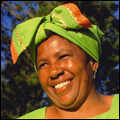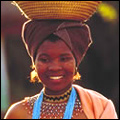
 |
 |
 |
 |
 |
 |
 |
 |
 |

|
One country, many tongues: South Africa is a nation of 44.8 million people of diverse origins, cultures, languages and beliefs. South Africa's Constitution recognises and guarantees equal status to 11 official languages - so preserving South Africa’s much-cherished heterogeneity. The 11 official languages in alphabetical order are (in alaphabetical order):
English is generally understood across the country, being the most commonly used language in official and commercial public life. However, it ranks fifth out of the 11 as a spoken language. According to the 2001 census isiZulu is the mother tongue of 23.8% of South Africans, followed by isiXhosa at 17.6%, Afrikaans at 13.3%, Sepedi at 9.4%, and English at 8.2%. Setswana is the mother tongue of 8.2% of South Africans, followed by Sesotho at 7.9%. The remaining four official languages are spoken at home by less than 5% of the population each. Other languages, which are widely spoken by South African citizens, but are not official, include Gujerati, Hindi, Arabic, Hebrew, Greek, German and Portuguese. The Nama and Khoi-San people speak languages that are not widely recognised outside their own communities. South African languages are colourful and borrow freely from each other in both vocabulary and sentence structure. South Africans - no matter what the ethnic backgrounds - share aspects of each other's cultures, and use phrases and words from each other's languages. The people of South Africa though diverse have all embraced the concept of "ubuntu" which means literally "I am because we are".
|





